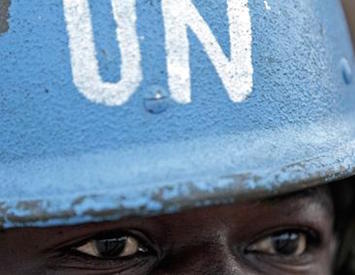Memory and context have become victims of the political debate, says Dr Adam Hughes Henry, and nowhere more than with the asylum seeker issue.
These days, our media world is one where historical memory and context have become the casualties of deliberate manipulations, populist polls and a never ceasing 24-hour spin cycle — both within and without the mainstream media machine.
It’s almost as if the past is nothing more than a dream, from which ideologues can cherry-pick what they need to defame their foes and secure power. The reality of evidence and facts, as has been demonstrated repeatedly by big tobacco and climate change denial, shows truth can be rendered almost meaningless.
The operative word here is, of course, 'almost'.
In Australia, over the last few decades, the trend toward selective newspeak has certainly accelerated. The betrayal of human rights in East Timor (and elsewhere) by both sides of Australian politics in the narrow pursuit of diplomatic and economic gain has a long history of clever and devious words providing every excuse and justification.
Across vast areas of debate it now seems almost impossible to question, query, or engage in any critical historical dialogue without abuse, spin or ignorance. The prerequisite for meaningful reflection ‒ namely philosophical curiosity and doubt ‒ are considered obvious personal weaknesses.
The more bold the assertion, the more decisive the asserter becomes.
Last year, Dr Peter Phelps, a right wing New South Wales State politician, gave an extraordinary five minute speech on the 11th September anniversary, praising and defending the brutal, murderous, dictatorship of Chilean General Augusto Pinochet.
I contacted the politician by email, politely asking about the sources upon which his speech were based. I received further quotes by email, justifying Pinochet's coup and regime — but no sources. When these sources were put through a source checking program, Wikipedia emerged as the only source.
When I brought this to the attention of the honourable gentleman, and ask him if he consulted anything else for his speech, the response was revealing.
I was instantly treated as a political enemy — accused of being a Marxist historian, of being a left-wing brain-washer of young malleable minds, of being clearly biased, because I had dared ask about his speech, rather than someone from the Australian Greens.
When I highlighted that these inferences were clearly incorrect and that my only interest remained the sources and the curious ways they were used in the speech, this too ‒ along with my academic professionalism ‒ were smugly belittled.
The same NSW politician, I discovered, had described traffic lights as a centrally controlled “Bolshevik menace”, but roundabouts as bastions of “democratic freedom”.
Wow!
On the question of Chile, what exactly was the level of public debate contributed? On the anniversary of a major Chilean historical event a minor Australian politician gave a speech by any fair measure defending and justifying the brutal Pinochet's coup and his sub-fascist regime, the speech made absolutely no mention of the well documented U.S. role in manipulating and supporting the coup in Chile, and the speech selectively cherry picked materials from Wikipedia without acknowledgment.
Ultimately the only purpose of this speech was to attack his political opponents in the NSW Parliament, in this case the Greens, while the victims of Pinochet became nothing more than inconvenient footnotes.
The Phelps speech is not an anomaly; it is symptomatic of a wider and more established malaise in public debate. Indeed, Paul Keating along with John Howard have contributed enormously in shaping what might be considered a ruthlessly opportunistic post-truth Prime Ministership. The political landscape is one in which facts and truth have become only of secondary concern. The debate on asylum seekers in Australia is now about as sophisticated as the Phelps speech on Pinochet.
Political spin of both major parties would now have us believe that the billions of dollars spent on detention centres and off shore processing have only ever been about territorial sovereignty and a moral crusade to prevent people drowning at sea. Both sides of Australian politics have seemingly now adopted this strange proposition in order to justify highly punitive policies towards asylum seekers. Therefore, the major parties only act in this unpalatable punitive manner in order to save lives. Vastly more people die horribly from tobacco and alcohol related issues, but as yet a comparable regime of unpalatable but necessary punitive measures designed to save these lives are yet to be implemented!
The asylum seeker issue has been of such enormous utility to both the right wing media and the Liberal Party, the Labor Party has itself robustly embraced offshore processing and mandatory detention. Indeed, it was the Keating Labor Government which introduced mandatory detention in order to discourage asylum seekers.
The moral high ground has never been so low.
It is well known that opinion polling on the issue of those coming by boat to seek asylum is very negative in certain vocal sections of Australian society. For over a decade, boat arrivals have been subject to an ongoing litany of misinformation, allegations, stereotypes and propaganda. This has now become arguably the level of the mainstream Australian debate.
The question is not ‒ how do we uphold Australian commitments under international law and process asylum applications in a speedy and dignified manner ‒ but rather, how do we stop the boats.
Let's take the argument seriously and consider the problem.
The blindingly obvious answer is that it must, surely, be cheaper, quicker and more humane for the Australian Government to use its Navy to pick up and process boat arrivals on the Australian mainland rather than in a foreign nation.
Australia has the logistical, economic and policing capacity to process boat arrivals within its wider community. This would obviously prevent and minimise any drowning deaths at sea, provide better health outcomes for refugees and, not that this seems to be a major issue with recent governments, comply with international law. Those found not to be genuine refugees can still be sent back to a safe point of return. Furthermore, there is absolutely no reason that the Australian Federal Police (AFP) could not still investigate and prosecute people smuggling in the wider region.
But would this approach poll as well? This seems to be the main driving concern.
For the purposes of its own domestic political gain, the Abbott government is now, quite clearly, prepared to hold itself above accountability and explanation, needlessly risk ongoing and damaging diplomatic tensions with our near neighbours and, more worryingly, risk the lives of vulnerable people at sea.
The fate of fellow human beings has now become a secondary concern — the main game is to pander apologetically to the worst kinds of political opportunism.
Now is the time for us to say no.

This work is licensed under a Creative Commons Attribution-NonCommercial-NoDerivs 3.0 Australia License
The originals of John Graham's art, featured above, as well as elsewhere on IA, are available for purchase by contacting the editor at editor@independentaustralia.net.
Support independent journalism Subscribe to IA.











